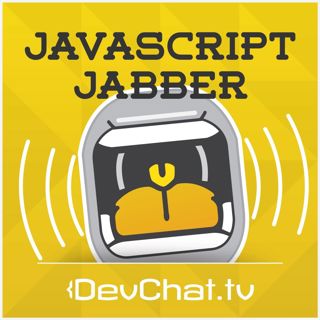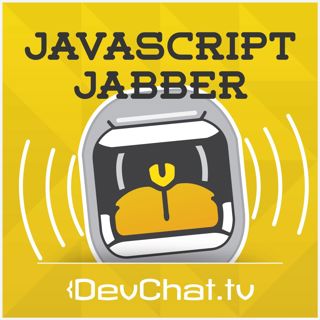
The Next Wave of Dev Tools: AI Assistants and JavaScript Workflows - JSJ 686
In this episode of JavaScript Jabber, we sit down with Vinicius Dallacqua, a seasoned software engineer with a passion for performance and developer tooling. Vinicius shares his journey from coding in...
14 Aug 20251h 6min

Inside VueConf: Nuxt 4, AI in Development, and the Future of Vue with Erik Hanchett - JSJ 685
In this episode of JavaScript Jabber, we welcome back Erik Hanchett, Senior Developer Advocate at AWS, to dive into his experience at VueConf. From the energy of the Vue community to lightning talks o...
8 Aug 202558min

Running Doom in TypeScript’s Type System with Dimitri Mitropoulos - JSJ 684
What if I told you someone managed to run Doom inside TypeScript’s type system? Sounds insane, right? That’s exactly what our guest Dimitri Mitropoulos did—and in this episode, we dive deep into the h...
1 Aug 20251h 18min

Preact, Performance, and the Future of Lightweight Frontends with Ryan Christian -JSJ 683
In this episode of JavaScript Jabber, we sit down with Ryan Christian, a core maintainer of Preact, to talk all things lightweight, performant, and practical in the JavaScript world. If you’ve ever wo...
23 Juli 20251h 7min

Speaking Up: The Developer’s Guide to Conference Talks & Career Growth - JSJ 682
In this episode of JavaScript Jabber, I am joined by three incredible guests — Ariel Shulman, Liad Yosef, and Evyatar Alush — to dive into the world of public speaking in tech. From the jitters of the...
10 Juli 20251h 44min

How Holepunch Is Redefining Peer-to-Peer Apps with Bare.js — A New Era for JavaScript Developers -JSJ 681
In this episode, we sit down with Mathias Madsen, CEO of Holepunch, and take a wild ride through the cutting edge of peer-to-peer JavaScript development. Mathias shares his journey from accidentally d...
24 Juni 20251h 6min

Migrating a Legacy JavaScript Codebase to TypeScript - JSJ 680
In this episode, Dan and I (Steve) dove deep into what turned out to be a surprisingly complex, yet incredibly insightful topic: gradually migrating a massive legacy JavaScript project over to TypeScr...
5 Juni 20251h 25min

TypeScript, Security, and Type Juggling with Ariel Shulman & Liran Tal - JSJ 679
In this episode, we dove headfirst into the swirling waters of TypeScript, its real-world use cases, and where it starts to fall short—especially when it comes to security. Joining us from sunny Tel A...
29 Maj 20251h 32min






















